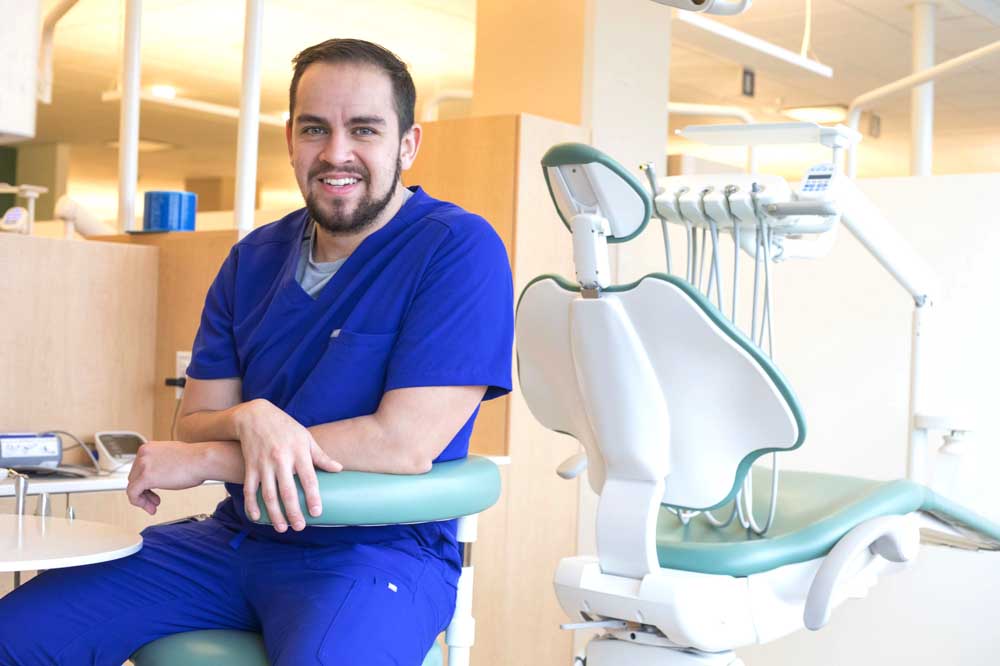Oregon seeks stability for ‘dreamers’
Published 2:05 pm Monday, April 2, 2018

- Eddie Ramirez, 25, of Portland, a dental student at Oregon Health Science University. Ramirez, an undocumented immigrant brought to the country when he was 8 years old, could face difficulties obtaining a license to practice.
Portland resident Eddie Ramirez has wanted to be a dentist since he was 8 years old. He earned a scholarship to Oregon Health Science University School of Dentistry and will spend thousands of dollars to apply for a dentist license when he graduates later this year.
Yet, the 25-year-old who grew up in Oregon may not be permitted to fulfill his dream because he is a “dreamer,” one of the tens of thousands of unauthorized immigrants brought to Oregon as young children.
The avenue for Ramirez and other dreamers to avoid deportation and obtain work permits — the Deferred Action for Childhood Arrivals program — is in peril under the Donald Trump administration and is under debate in federal courts.
“I am scared and exhausted from being in limbo,” Ramirez said. “It seems like we are being used as some sort of negotiating chip, and I feel that they sometimes forget there are people behind those stories.”
With no immediate resolution to DACA, states such as Oregon are intervening to provide a pathway for dreamers to move forward with their lives amid federal uncertainty. That can range from giving dreamers access to in-state college tuition to allowing them to obtain professional licensure.
Trump in a series of tweets April 1- 2, said there will be no deal on DACA despite months of political wrangling.
Under threat of litigation by conservative states, Trump attempted to end DACA last year, arguing that former President Barack Obama lacked the authority to create the program through executive order.
The president and Congress failed to meet a March 5 deadline to come up with a permanent legislative solution for dreamers. The program was scheduled to end that day, but judges have issued injunctions to allow DACA renewals while challenges to its termination are pending in court.
Oregon lawmakers earlier this year passed two bills to protect the ability of unauthorized immigrants who grew up in the state to continue to qualify for resident undergraduate tuition at state colleges and universities and to renew their driver’s licenses.
Sen. Michael Dembrow, D-Portland, said he plans to introduce legislation next year that would expand resident tuition to graduate study for that population and ensure they can obtain professional licensure.
Ten states — California, Florida, Illinois, Minnesota, Nebraska, Nevada, South Dakota, Utah, West Virginia and Wyoming — have enacted laws allowing professional licenses for certain immigrant populations, according to a study last year by the National Conference of State Legislatures.
The laws seek to fill state labor shortages, tap underutilized immigrant talent and reap economic benefits of those workers’ improved income, spending and tax revenues.
Some laws apply broadly such as California’s. In that state, unauthorized immigrants can obtain any professional license if they meet all other requirements. New York opens professional licenses up to DACA recipients. In other states, the laws are targeted to fill labor shortages in certain professions, according to the NCSL study.
Barriers to licensure is a national problem for certain populations, including immigrants and felons.
State occupational license requirements lack uniform standards. In Oregon, there are wide differences between some of the state’s approximately 150 occupational licenses, Dembrow said.
“There is not really a master template for occupational licenses, and so these licenses and their requirements get set up in a haphazard way,” Dembrow said.
Gov. Kate Brown’s office intended to survey the state’s licensing boards to find out what barriers exist for dreamers, he said. The Governor’s Office did not respond to several requests over the past month for details about the survey.
Some licensing boards, such as the Oregon Board of Dentistry and those through the state Health Licensing Office, have rules that allow DACA recipients to receive licenses.
At the Health Licensing Office, license applicants can submit a driver’s license or Social Security card to apply. Those are documents a DACA recipient would likely possess but that other unauthorized immigrants would have no way to access under state law.
Many of those unauthorized immigrants could be DACA eligible but never applied and now no longer can. Recent court decisions have kept DACA in place for renewals, but Homeland Security is not accepting new applications, said Andrea Williams, executive director of Causa, an Oregon immigrant rights advocacy center.
There are more than 11,000 DACA recipients in Oregon and an unknown number of additional dreamers who are not enrolled in the program, she said.
Ramirez’s family immigrated from Guadalajara, Mexico, to Portland when he was 18 months old. His younger brother was born in Portland four years later. His parents worked multiple jobs to support their family.
“I find it frustrating that in the eyes of some individuals, I am a criminal, and I am not deserving of where I am,” Ramirez said. “I am not a criminal. The mistake I made was being born to parents who wanted a better future for me.”





